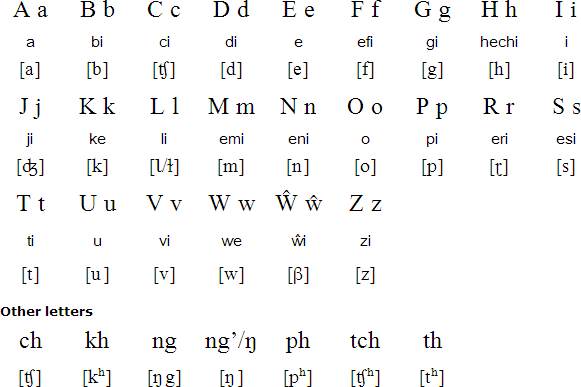Chichewa is a Bantu language spoken in Malawi, Zambia, Mozambique, Zimbabwe, Eswatini and Bostwana. In Malawi Chichewa is spoken in the central and southwest of the country, and there were about 6.5 million speakers in 2009. The language is taught in primary schools, and used in newspapers and on the radio.
In Zambia Chichewa is spoken in the Central and Eastern provinces, and there were about 2.1 million speakers in 2010. There were about 599,000 speakers in Mozambique in 2006, and the language is known as Nyanja. In Zimbabwe there were about 405,000 speakers of Chichewa in 2012, and the language is spoken mainly in Mashonaland Central province. There were about 7,400 Chichewa speakers in Eswatini in 2017.
There are some differences between the Chichewa of Malawi and the Nyanja of Zimbabwe, however they are not considered separate languages. One variety known as Town Nyanja, which is spoken in Lusaka and other parts of Zambia, differs significantly from Nyanja and Chewa.
Chichewa is also known as Chewa, Chinyanja, Cinyanja, Nyanja or Nyanja-Chewa.
Chichewa was first written by António Gamitto in the 1830s, who explored the area now known as Malawi and Zambia and made ethnographic and linguistic notes, and lists of vocabulary. More extensive documentation of the language was made in the 1850s by Johannes Rebmann, a German missionary and explorer, who published a dictionary of Chichewa in 1877. A grammar of Chichewa was published by Alexander Riddel in 1880, and the first Chichewa version of the Bible came out in 1912.
A standard way of writing Chichewa, the Chinyanja Orthography Rules, emerged in 1931. The current orthography of Chichewa was standardised in 1973 when the New Chichewa Orthography Rules were published.

Hear how to pronounce Chichewa:
Download an alphabet chart for Chichewa (Excel)
Anthu onse amabadwa aufulu ndiponso ofanana mu ulemu ndi ufulu wao. Iwowa ndi wodalitsidwa ndi mphamvu zoganiza ndi chikumbumtima ndipo achitirane wina ndi mnzake mwaubale.
Anthu onse amabadwa mwa ufulu ndiponso olinganga m' makhalidwe ao. Iwo amakhala ndi nzeru za cibadwidwe kotero ayenera kucitirana zabwino wina ndi mnzace.
All human beings are born free and equal in dignity and rights. They
are endowed with reason and conscience and should act towards one another
in a spirit of brotherhood.
(Article 1 of the Universal Declaration of Human Rights)
Information about Chichewa | Phrases | Numbers | Tower of Babel
Information about the Chichewa language
http://www.humnet.ucla.edu/humnet/aflang/chichewa/
http://en.wikipedia.org/wiki/Chichewa_language
Online Chichewa lessons
http://nature.berkeley.edu/~alyons/chichewa/
http://learnchichewa.com/chichewa-resources/
Online Chichewa dictionary
http://translate.chichewadictionary.org/
Chichewa/(Chi)nyanja phrases
http://wikitravel.org/en/Nyanja_phrasebook
http://members.tripod.com/~malawi/chichewa.html
Aka, Bafaw-Balong, Bangi, Basaa, Bemba, Bembe, Bena, Benga, Bhaca, Bube, Bukusu, Bulu, Central Teke, Chichewa, Chokwe, Chuwabu, Comorian, Dciriku, Digo, Duala, Eton, Ewondo, Fang, Ganda/Luganda, Gogo, Gusii, Gwere, Haya, Hehe, Herero, Ibinda, Ikizu, Ikoma, Jita, Kabwa, Kako, Kamba, Kiga, Kikuyu, Kimbundu, Kinyarwanda, Kirundi, Kisi, Kogo, Komo, Kongo, Konjo, Koti, Kukuya, Kunda, Kuria, Kwambi, Lambya, Lingala, Loma, Lozi, Luba-Katanga, Luchazi, Lunda, Luvale, Luyana, Makaa, Makonde, Makhuwa, Mandekan, Maore, Masaaba, Mbama, Mbere, Mbukushu, Mbunda, Mbuun, Mende, Mongo, Mpiemo, Mushungulu, Mwani, Nambya, Nande, Ngoni, Nkore, North Teke, Northern Ndebele (South Africa), Northern Ndebele (Zimbabwe), Northern Sotho, Nyamwezi, Nyakyusa, Nyemba, Nyole, Nyoro, Nyungwe, Nzadi, Oroko, OshiWambo, Pagibete, Punu, Ronga, Safwa, Sena, Sengele, Shona, Soga, Songe, Southern Ndebele, Southern Sotho, Sukuma, Swahili, Swati, Tanga, Tembo, Tonga, Tooro, Tshiluba, Tsonga, Tswa, Tswana, Tumbuka, Umbundu, Venda, Vili, Vwanji, Xhosa, Yakam, Yansi, Yao, Yasa, Yeyi, Zigula, Zinza, Zulu
Languages written with the Latin alphabet
Page last modified: 07.03.23
[top]
You can support this site by Buying Me A Coffee, and if you like what you see on this page, you can use the buttons below to share it with people you know.

If you like this site and find it useful, you can support it by making a donation via PayPal or Patreon, or by contributing in other ways. Omniglot is how I make my living.
Note: all links on this site to Amazon.com, Amazon.co.uk
and Amazon.fr
are affiliate links. This means I earn a commission if you click on any of them and buy something. So by clicking on these links you can help to support this site.
[top]